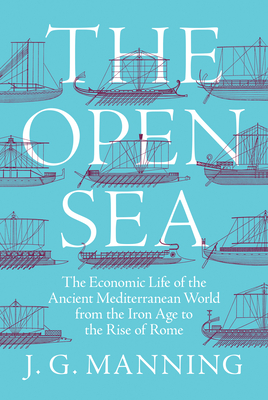

 Princeton University Press
Princeton University Press
The Open Sea: The Economic Life of the Ancient Mediterranean World from the Iron Age to the Rise of Rome


Key Metrics
- J G Manning
- Princeton University Press
- Hardcover
- 9780691151748
- 9.3 X 6.2 X 1.5 inches
- 1.75 pounds
- History > Ancient - General
- English
 Secure Transaction
Secure TransactionBook Description
A major new economic history of the ancient Mediterranean world
In The Open Sea, J. G. Manning offers a major new history of economic life in the Mediterranean world in the Iron Age, from Phoenician trading down to the Hellenistic era and the beginning of Rome's imperial supremacy. Drawing on a wide range of ancient sources and the latest social theory, Manning suggests that a search for an illusory single ancient economy has obscured the diversity of lived experience in the Mediterranean world, including both changes in political economies over time and differences in cultural conceptions of property and money. At the same time, he shows how the region's economies became increasingly interconnected during this period.
The Open Sea argues that the keys to understanding the region's rapid social and economic change during the Iron Age are the variety of economic and political solutions its different cultures devised, the patterns of cross-cultural exchange, and the sharp environmental contrasts between Egypt, the Near East, and Greece and Rome. The book examines long-run drivers of change, such as climate, together with the most important economic institutions of the premodern Mediterranean--coinage, money, agriculture, and private property. It also explores the role of economic growth, states, and legal institutions in the region's various economies.
A groundbreaking economic history of the ancient Mediterranean world, The Open Sea shows that the origins of the modern economy extend far beyond Greece and Rome.
Author Bio
Manning specializes in Hellenistic history with particular focus on the legal and economic history of Ptolemaic Egypt. His interests lie in governance, reforms of the state, legal institutions, formation of markets, and the impact of new economic institutions (coinage, banking) on traditional socio-economic patterns in the ancient world. He is also deeply concerned with Papyrology, the interpretation of ancient sources, and bringing to bear the historical social sciences, particularly Economic Sociology and economic and legal theory, to ancient history.
He has published three monographs: The Hauswaldt Papyri. A Family Archive from Edfu in the Ptolemaic Period. Demotische Studien, Vol. 12. Würzburg, 1997, Land and power in Ptolemaic Egypt. The structure of land tenure 332-30 BCE. Cambridge University Press, 2003, and The last pharaohs. Egypt under the Ptolemies, 305 – 30 BC. Princeton University Press, 2009 (appearing in October). He has also edited (with Ian Morris, Stanford University) a volume on economic history: The Ancient Economy: Evidence and Models. Stanford University Press, 2005, and Law and society in Egypt from Alexander to the Arab Conquest (330 BC-640 AD. Co-edited with J.G. Keenan & Uri Yiftach. Cambridge University Press. He is on the editorial boards of Studia Hellenistica (Leuven) and the Palgrave Studies in Ancient Economies.
Manning’s current research is situated at the intersection of Paleoclimatology and the economic history of the premodern world. He is particularly interested in ice core geochemistry, a very exciting and dynamic science. Manning is part of a small team that has been working on understanding the impacts of explosive volcanic eruptions on the Nile watershed. The team has so far focused on the Ptolemaic period but plan on extending the study through Late Antiquity and examining the inter-regional impacts of climate change across the Mediterranean world, with particular focus on the Nile and Euphrates rivers.
Before coming to Yale, Manning taught for 12 years at Stanford University and two years at Princeton University. Manning is a Professor in both the Classics and the History Departments at Yale, and a Senior Research Scholar at Yale Law School. He is a collaborative member of Yale’s Program in Economic History. He received his B.A. from Ohio State, and his M.A. and Ph.D. from the University of Chicago.
Source: Department of History Yale University
Photo Credit: Reno Venturi
Videos
No Videos
Community reviews
Write a ReviewNo Community reviews